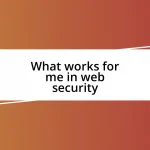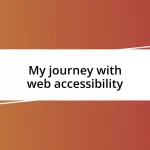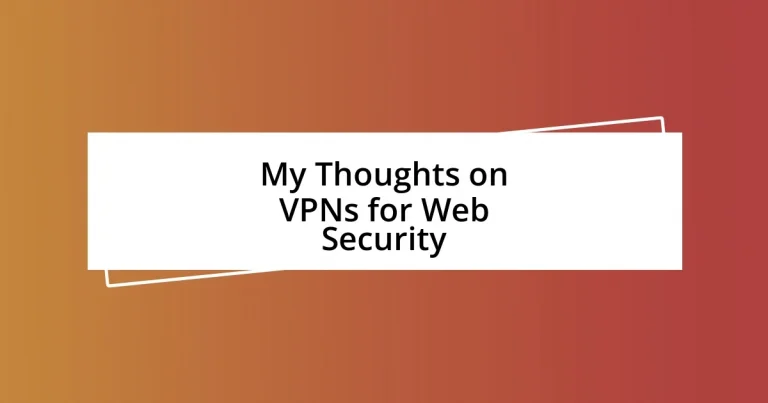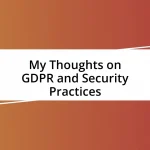Key takeaways:
- VPNs enhance online security by encrypting connections, providing data protection on public Wi-Fi, and preventing ISP throttling.
- Choosing the right VPN involves key factors such as security features, no-logs policies, speed, and ease of use.
- Trust in VPN providers is crucial; misconceptions about anonymity and performance underscore the importance of selecting reputable services.
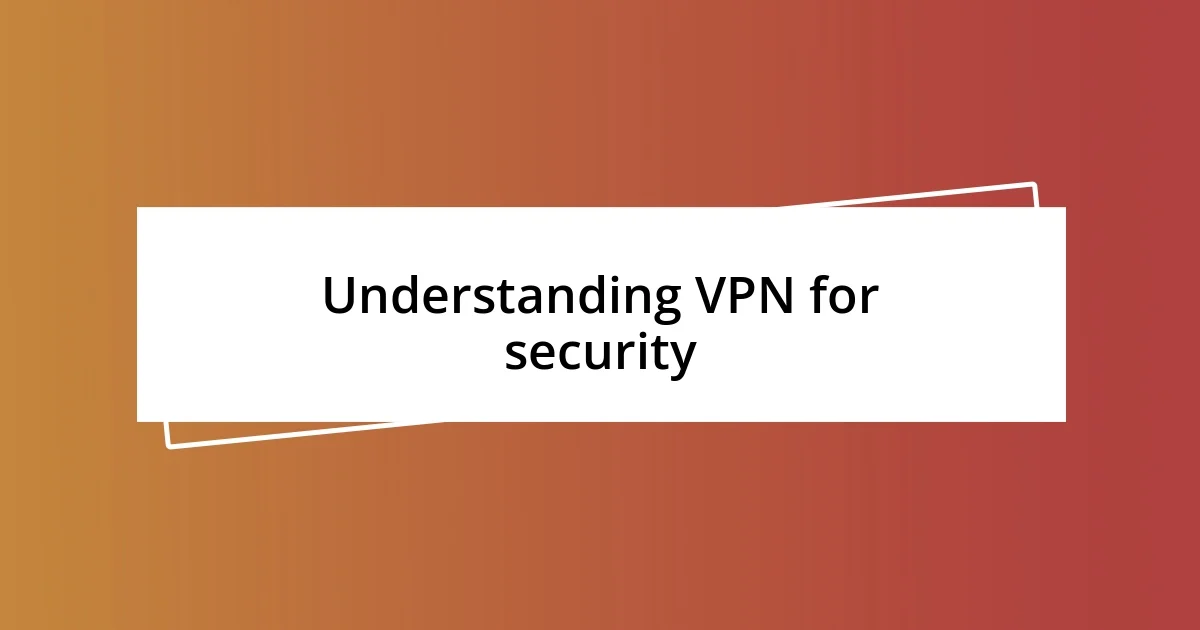
Understanding VPN for security
When I first discovered VPNs, I was genuinely surprised at how they operate. A Virtual Private Network encrypts your internet connection, making it nearly impossible for anyone—hackers, ISPs, or even government entities—to see what you’re doing online. It felt empowering to understand that my online privacy could be significantly enhanced simply by using this technology.
It’s fascinating to think about how a VPN changes the way we interact with the internet. One time, while traveling, I used a VPN to access my bank account. The feeling of security that enveloped me as I logged in was incredible. It’s this layer of protection that allows me to browse freely without the constant worry of prying eyes.
Using a VPN often leads to a common question: “Is it really worth it?” In my experience, the answer is a resounding yes. The security and anonymity it provides far outweigh the small effort it takes to set up, transforming your online experience into something uniquely safe and personal.
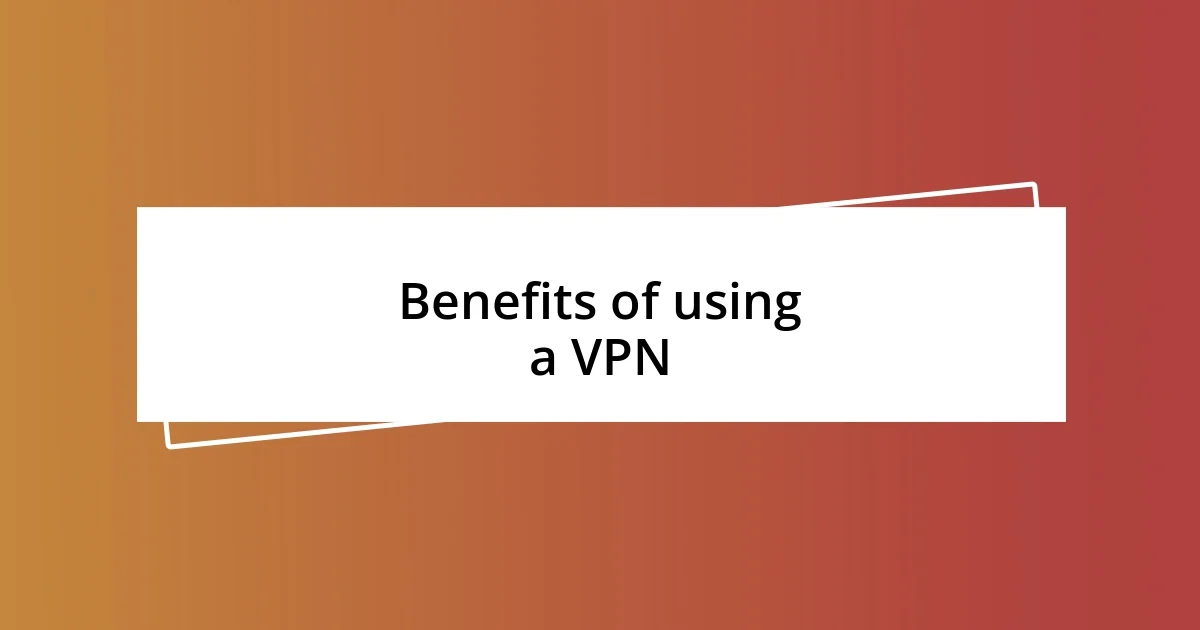
Benefits of using a VPN
Using a VPN offers numerous benefits, particularly when it comes to enhancing your online security. One of the standout advantages for me is the encryption of my data. I recall the first time I connected to public Wi-Fi in a café; I was cautious but still curious. What I didn’t know then was how vulnerable I could be without a VPN. Once I started using one, I felt a sense of relief knowing my sensitive information, like passwords and credit card numbers, was safeguarded—even in a bustling public space.
Another significant benefit is geographical freedom. There have been times when I wanted to catch up on shows only available in certain countries. With a VPN, I could easily change my virtual location and access those streaming services. The excitement when I successfully navigated those barriers is something I’ll always remember. This flexibility has transformed my online experience and allowed me to explore more content than ever before.
Lastly, using a VPN protects against ISP throttling, which I’ve definitely experienced. There were instances when my internet seemed to slow down, especially during streaming. Once I began using a VPN, I noticed a stark difference in speed. It felt like regaining lost internet freedom. This added layer not only enhances my browsing speed but also ensures a smoother experience overall.
| Benefit | Description |
|---|---|
| Data Encryption | Secures sensitive information from hackers, especially on public Wi-Fi. |
| Geographical Freedom | Allows access to content restricted in your region, enhancing entertainment options. |
| Protection Against ISP Throttling | Prevents internet slowdowns caused by your Internet Service Provider based on usage. |
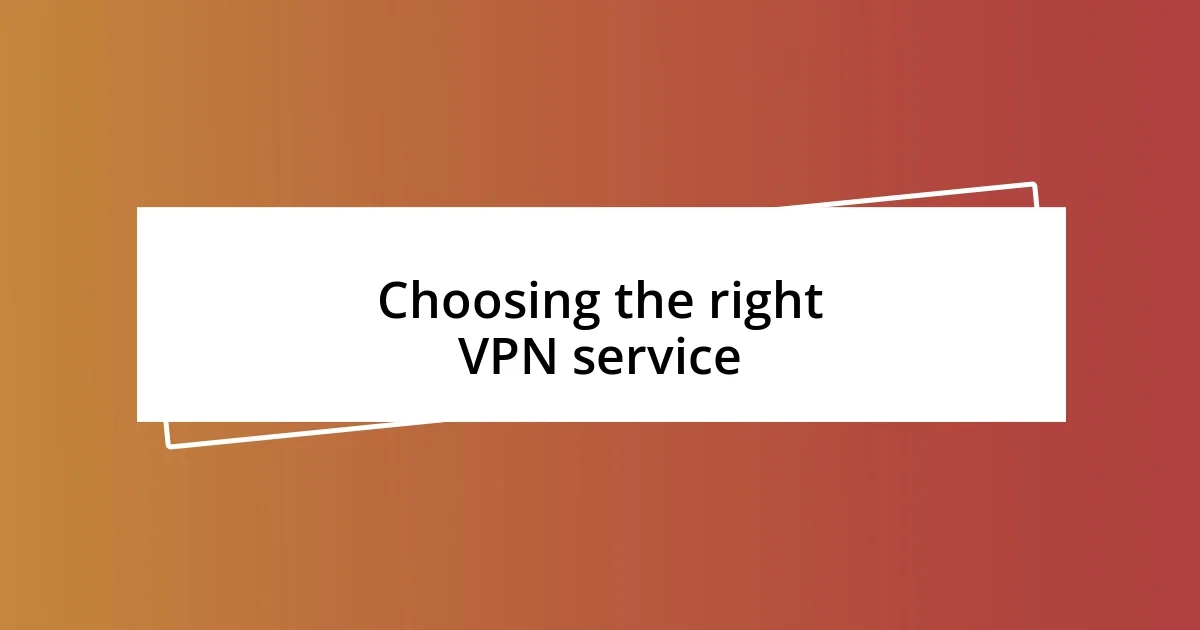
Choosing the right VPN service
Choosing the right VPN service can feel overwhelming with so many options available. Personally, I’ve learned that it’s essential to focus on a few key aspects to find the best fit for my needs. For instance, I remember the first time I was swayed by a flashy advertisement for a VPN service, only to realize later that it lacked crucial features like a no-logs policy and strong encryption. It was a stark reminder that not all VPNs are created equal.
Here are some important factors to consider when selecting a VPN service:
- Security Features: Look for strong encryption standards and additional features like a kill switch, which disconnects your internet if the VPN connection drops.
- No-Logs Policy: Ensure the service doesn’t keep logs of your activity; this is crucial for maintaining your privacy.
- Speed and Performance: Test out the VPN with a free trial if possible; you want it to keep your browsing fast and responsive.
- Server Locations: More server choices mean greater flexibility in accessing content from different regions, which I’ve found incredibly beneficial.
- User-Friendly Interface: A simple and intuitive app makes using a VPN so much easier, especially when you’re in a hurry. I really appreciate when I can connect with just a few clicks.
When I finally settled on a VPN that ticked all these boxes for me, it felt like finding the perfect fit for a puzzle piece. The relief knowing I made the right choice for my online security was palpable. Each time I connect, I’m reminded of the peace of mind that comes with knowing I’m protected.
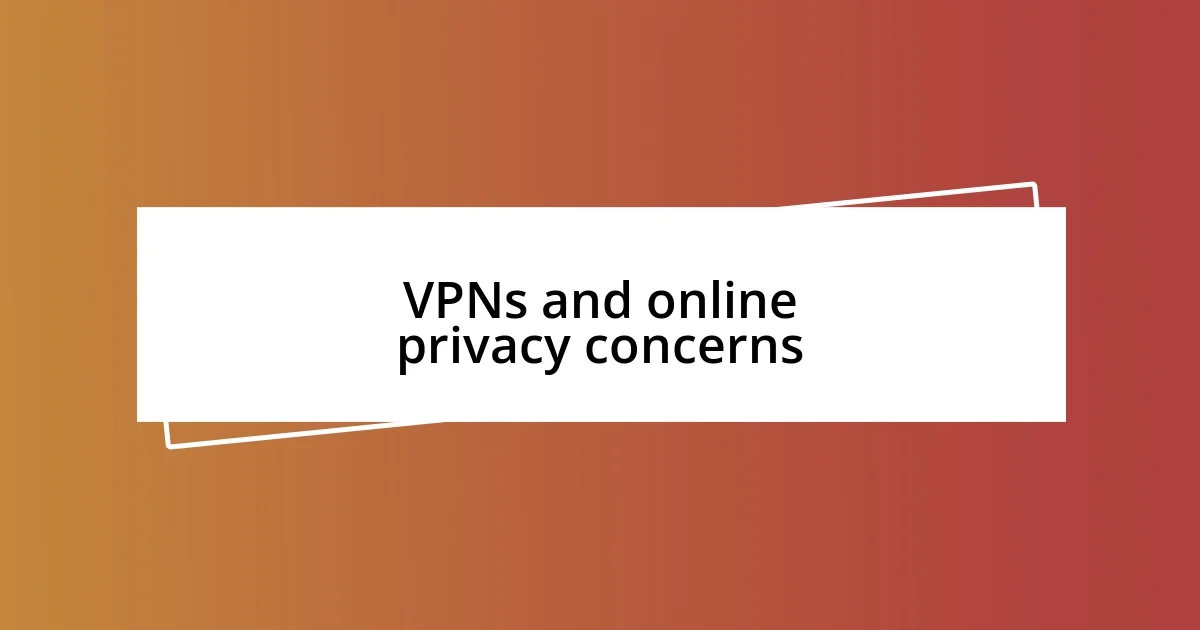
VPNs and online privacy concerns
When I think about VPNs and online privacy, one key concern stands out: trust. Using a VPN means entrusting your data to a third party, which can be a tricky proposition. I often wonder—are they really protecting my information, or could they, in turn, be just as invasive as the entities I’m trying to avoid? It’s crucial to choose providers who are transparent about their policies and have strong reputations.
Moreover, I’ve had my share of scares. Like many, I used to think public Wi-Fi was harmless—until I discovered how easily cybercriminals could intercept data over unsecured networks. The first time I realized my browsing habits could be tracked, I felt a twinge of anxiety. That experience pushed me toward a VPN, highlighting the importance of not only securing my data but also maintaining my anonymity online.
Additionally, there’s the issue of data logging. Knowing that some VPNs keep records of user activity makes me uneasy. I want my online actions to stay private—just like I would shield my letters from prying eyes. I’ve learned to always verify that a provider has a strict no-logs policy, because ensuring my digital footprint remains minimal is central to my online privacy strategy.
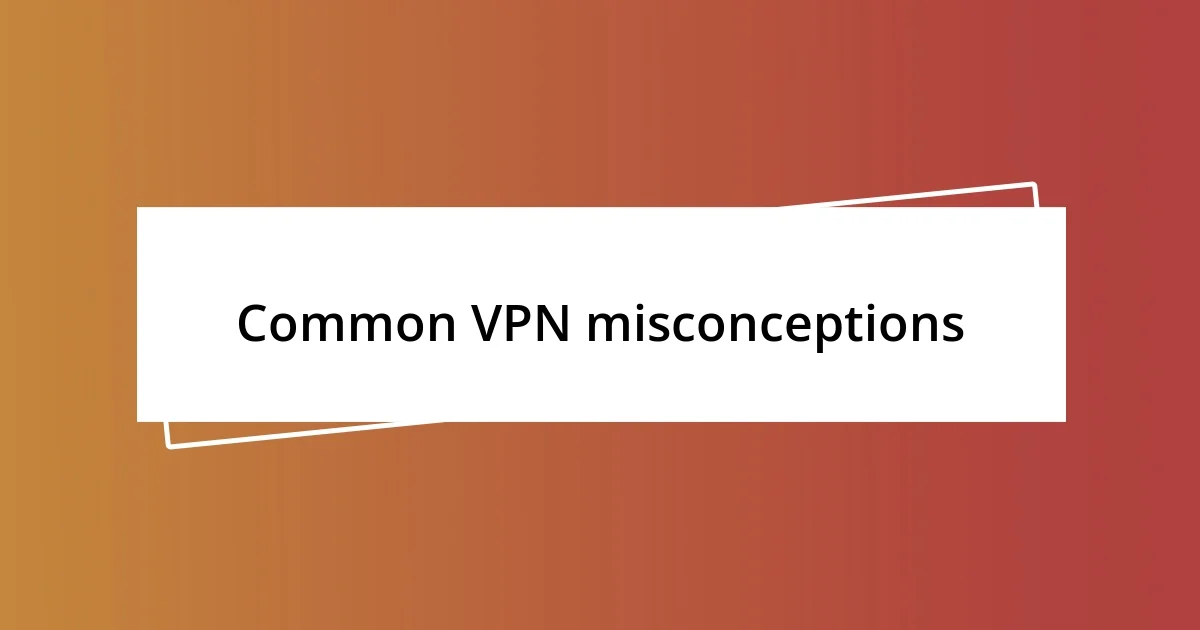
Common VPN misconceptions
I often hear people claim that VPNs guarantee anonymity online, and while they do enhance privacy, that’s not quite the full picture. I learned this the hard way after using a VPN service that still logged some data. It left me questioning just how private my browsing really was. The truth is, while a VPN hides your IP address from outside eyes, if you’re not vigilant about your provider’s policies, you could still be leaving a trail.
Another common misconception is that all VPNs provide the same level of security. I can’t stress enough how this isn’t true. During my early days of using a VPN, I picked one based solely on its low price, thinking I’d hit the jackpot. However, I soon found out that its encryption standards were subpar, leaving my data vulnerable. It was a painful lesson in realizing that sometimes, you really do get what you pay for.
Lastly, many people assume that a VPN will drastically slow down their internet speed. I used to worry about this too. But after testing several services, I discovered that not all VPNs affect speed equally. Some managed to keep my connection fast and smooth, which was a pleasant surprise. So, if you’re hesitant about using one due to speed issues, I encourage you to explore options—you might just be pleasantly surprised.
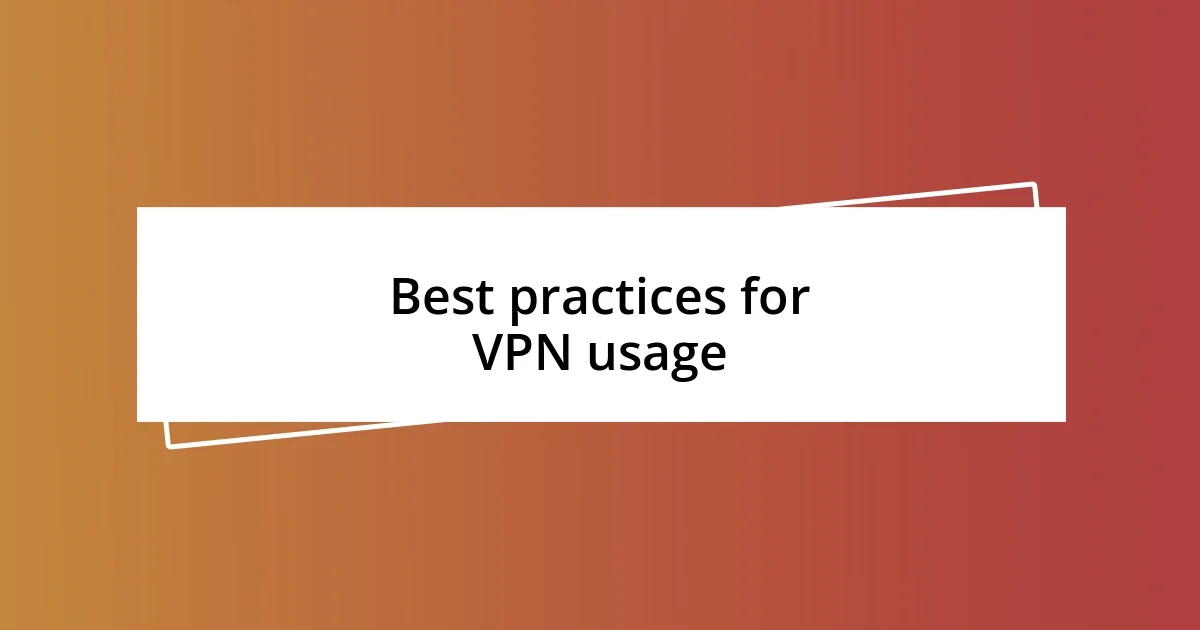
Best practices for VPN usage
One essential practice I’ve learned over time is to regularly update my VPN application. It’s surprising how many users overlook this simple step. Each update often includes security patches and new features that significantly enhance protection. A few weeks back, I neglected to update my VPN and surprisingly faced a few connectivity issues. It reminded me that staying current not only boosts performance but can also safeguard my privacy.
Another critical aspect is to avoid free VPN services altogether. At one point, I succumbed to the allure of a free option, thinking I could save some cash. However, I quickly discovered that with free services often comes compromised security, as they may sell user data or display intrusive ads. Reflecting on that experience, I realized that investing in a reputable VPN is well worth it for peace of mind—after all, aren’t our digital lives just as valuable?
Lastly, I always make it a habit to review my VPN settings and features regularly. It’s easy to set it and forget it, but doing so would be a mistake. Last month, I explored options like split tunneling and realized I could improve my browsing experience significantly by only routing sensitive traffic through the VPN. Have you ever checked your settings? You might find tools that can tailor your experience, allowing you to enjoy the benefits of a VPN while retaining optimal internet performance.
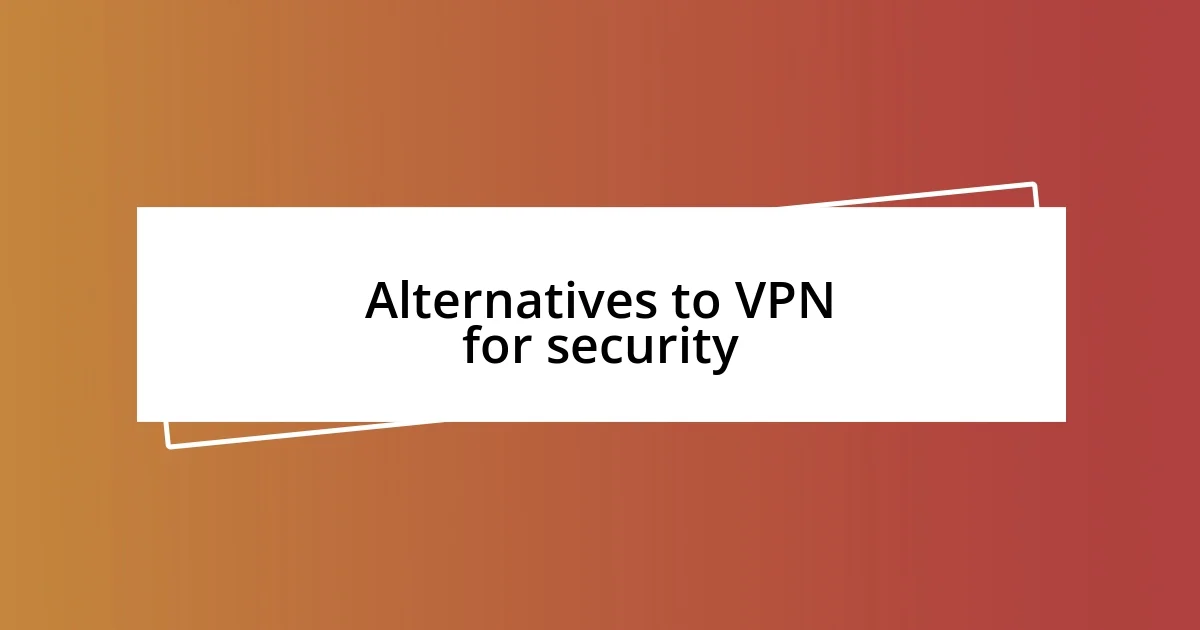
Alternatives to VPN for security
When considering alternatives to VPNs for web security, one option that often gets overlooked is using a reliable password manager. I started using one after a few too many close calls with online accounts being hacked. What struck me was how securely it stored my passwords and even generated complex ones for me. This experience made me realize that strengthening password security can be just as crucial as hiding your IP address.
Another solid choice is two-factor authentication (2FA), which adds an extra layer of protection. I can’t emphasize enough how this simple step has saved me from potential breaches. Just the other day, I received a notification that someone tried to log into my account. But because I had 2FA enabled, I received a prompt that blocked access until I verified it was me. Isn’t it reassuring to know you have that second line of defense?
Then there’s browser security settings, a feature many people inadvertently neglect. I’ve spent quite a bit of time tweaking my browser settings to enhance privacy, like disabling third-party cookies and using private browsing modes. Once, I was astonished to see how much tracking was happening behind the scenes, and adjusting these settings made a noticeable difference. Have you ever taken the time to check your browser’s privacy features? You might be surprised at how much control you actually have over your online presence without needing a VPN.
